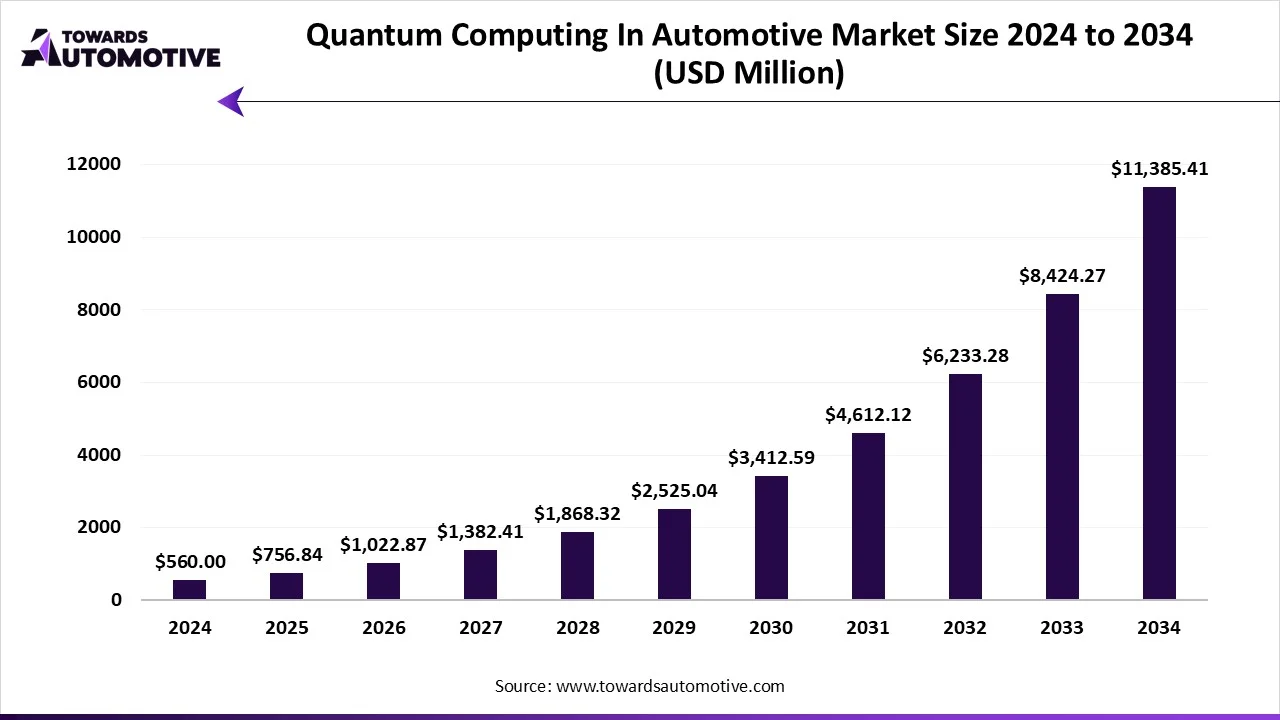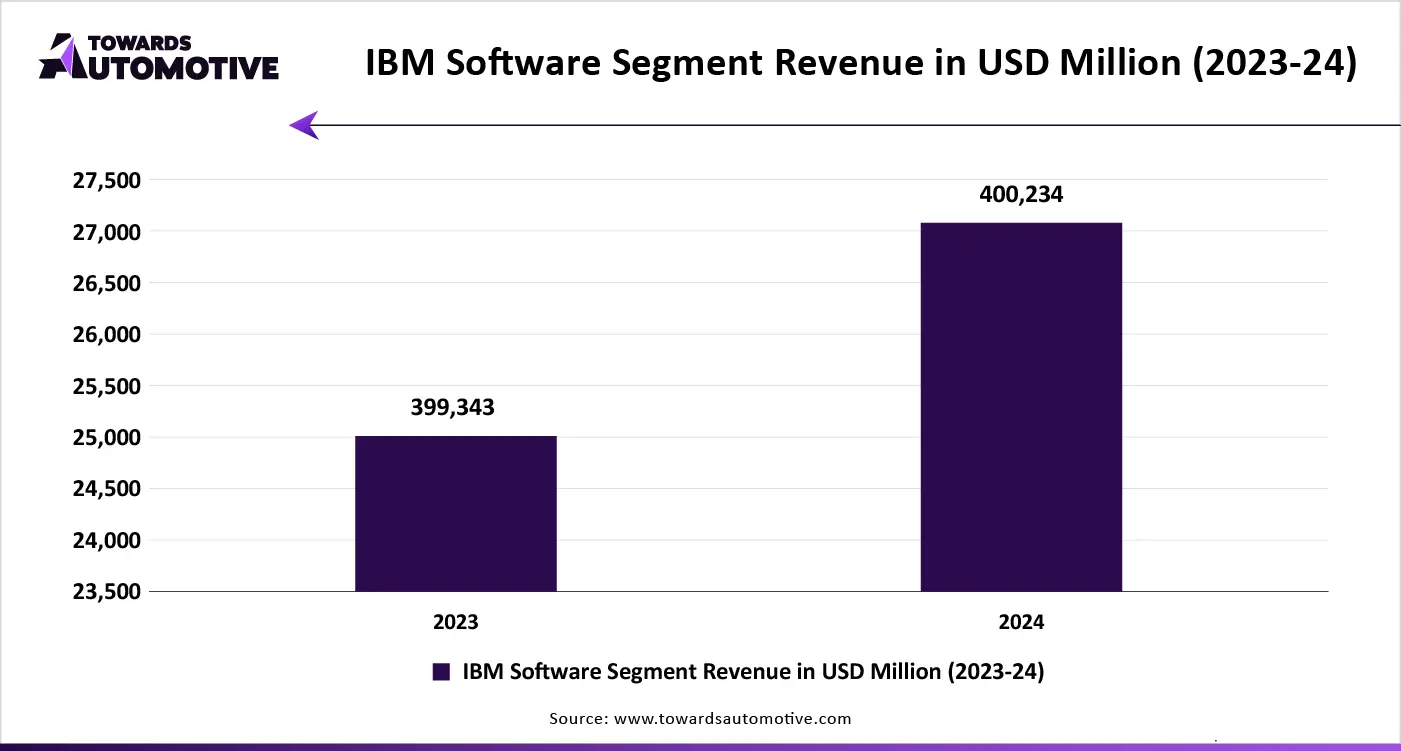December 2025
The quantum computing in automotive market is forecasted to expand from USD 756.84 million in 2025 to USD 11385.41 million by 2034, growing at a CAGR of 35.15% from 2025 to 2034. The increasing adoption of self-driving vehicles by fleet operators coupled with numerous government initiatives aimed at enhancing vehicular safety has boosted the market expansion.
Additionally, rapid investment by market players for advancing r&d associated with quantum computing along with rising demand for luxury vehicles from the HNIs in developed nations is playing a vital role in shaping the industrial landscape. The growing focus on creating fault-tolerant systems through advancements in logical qubits is expected to create ample growth opportunities for the market players in the upcoming years.

The quantum computing in automotive market is driven by the increasing sales of autonomous vehicles coupled with advancements in V2X technology. Quantum computing in the automotive sector uses qubits for solving complex problems in several areas such as vehicle design, autonomous driving, supply chain management, and enhancing security. These computing solutions are deployed in various modes including on-premises and cloud. The end-users of these solutions consists of automotive OEMs, tier-1 & tier-2 suppliers, technology & R&D companies, government & research institutes. This market is expected to rise significantly with the growth of the ICT sector in different parts of the world.
| Metric | Details |
| Market Size in 2024 | USD 560 Million |
| Projected Market Size in 2034 | USD 11385.41 Million |
| CAGR (2025 - 2034) | 35.15% |
| Leading Region | North America |
| Market Segmentation | By Application, By Deployment Mode, By Vehicle Type, By End-User Industry and By Region |
| Top Key Players | Volkswagen AG, BMW Group, Ford Motor Company, IBM Corporation, Google Quantum AI, Microsoft Corporation, Quantinuum, QMill, QNu Labs. |
The battery design & optimization segment dominated the market with a share of around 35%. The growing adoption of advanced computing solutions by battery makers has boosted the market growth. Also, rapid investment by battery companies for opening up technologically advanced manufacturing centers is playing a vital role in shaping the industrial landscape. Moreover, the increasing use of cloud-based quantum computing solutions by EV makers for designing EV batteries is expected to drive the growth of the quantum computing in automotive market.
The autonomous vehicle development & simulation segment is expected to grow with the highest CAGR during the forecast period. The growing sales of autonomous vehicles in several countries such as China, the U.S., Denmark and some other has driven the market growth. Also, numerous government initiatives aimed at mandating ADAS in vehicles coupled with technological advancements in self-driving cars is playing a crucial role in shaping the industry in a positive manner. Moreover, the rising deployment of self-driving cars by fleet operators for gaining maximum profits is expected to boost the growth of the quantum computing in automotive market.
The cloud-based quantum computing segment led the market with a share of around 55%. The growing adoption of cloud-based quantum computing solutions by automotive OEMs for enhancing design and optimization of modern cars has boosted the market growth. Also, rapid investment by technology providers for developing advanced cloud computing frameworks for the automotive sector is playing a vital role in shaping the industrial landscape. Moreover, numerous advantages of cloud including cost savings, scalability and flexibility, enhanced security and some others is expected to accelerate the growth of the quantum computing in automotive market.
The on-premise quantum computing segment is expected to expand with the highest CAGR during the forecast period. The rapid deployment of on-premises solutions in automotive workshops for operating numerous activities has boosted the market growth. Also, the rising emphasis of EV companies for deploying on-premises solutions for designing EV batteries is contributing to the industry in a positive manner. Moreover, several advantages of on-premises solutions including flexibility, superior control, high performance and some others is expected to propel the growth of the quantum computing in automotive market.
The passenger cars segment led the market with a share of around 45%. The growing sales of passenger cars in numerous prominent countries such as the U.S., India, China, Germany and some others has boosted the market expansion. Additionally, rapid deployment of autonomous taxis by fleet operators for reducing dependency on manual drivers is playing a prominent role in shaping the industrial landscape. Moreover, partnerships among passenger car manufacturers and tech providers to integrate cloud-computing in modern vehicles is expected to foster the growth of the quantum computing in automotive market.
The electric & hybrid vehicles segment is expected to grow with the fastest CAGR during the forecast period. The growing adoption of electric vehicles in several nations such as Germany, the U.S., Canada, China and some others has driven the market growth. Also, numerous government initiatives aimed at rising awareness about EVs coupled with integration of quantum computing for enhancing driving range in hybrid vehicles is playing a vital role in shaping the industrial landscape. Moreover, the rising consumer demand for eco-friendly vehicles is expected to drive the growth of the quantum computing in automotive market.
The automotive OEMs segment led the market with a share of around 40%. The growing adoption of quantum computing technology by automotive OEMs for operating several functions has boosted the market expansion. Also, technological advancements in the automotive sector coupled with rapid investment by EV makers for integrating cloud-based quantum computing in their manufacturing plants is contributing to the industry in a positive manner. Moreover, partnerships among automakers and technology providers is expected to propel the growth of the quantum computing in automotive market.
The technology & R&D companies segment is expected to expand with a the highest CAGR during the forecast period. The growing focus of technology providers for advancing research and development associated with quantum computing has boosted the market growth. Also, rapid investment by automotive brands for opening up new R&D centers is playing a vital role in shaping the industrial landscape. Moreover, collaborations among tech providers and automakers for deploying on-premises computing networks in manufacturing units is expected to foster the growth of the quantum computing in automotive market.
North America led the quantum computing in automotive market with a share of around 40%. The growing demand for luxury vehicles from the HNIs in the U.S. and Canada has boosted the market growth. Also, rise in number of automotive R&D centers along with increasing sales of autonomous trucks is playing a crucial role in shaping the industry in a positive manner. Moreover, the presence of various market players such as IBM, Google, Ford Motor Company and some others is expected to foster the growth of the quantum computing in automotive market in this region.
Asia Pacific is expected to grow with the highest CAGR during the forecast period. The rising adoption of electric vehicles in numerous countries such as China, Japan, India, South Korea and some others has driven the market expansion. Additionally, technological advancements in the automotive sector coupled with rapid deployment of self-driving vehicles by fleet operators is playing a prominent role in shaping the industrial landscape. Moreover, the presence of several market players such as Alibaba Group, Toyota Motor Corporation, SoftBank and some others is expected to boost the growth of the quantum computing in automotive market in this region.
| May 2025 | Announcement |
| Francis Chow, Red Hat vice president and general manager for In-Vehicle Operating System and edge | What we’re aiming at is to ease the operations of managing edge devices. We want to make it easy for onboarding, configurating, updating, troubleshooting and monitoring edge devices. |
| June 2025 | Announcement |
| Shamik Basu, vice president, Verizon Business | Cars are evolving from mechanical vehicles to software-defined mobile devices with the ability to leverage incredible connected technology. Edge Transportation Exchange leverages that technology to give automakers, governments, and tech developers a robust platform for building out the cellular-connected future of transportation – with visibility and reliability for all road users top of mind. |
| June 2025 | Announcement |
| Ryo Hayashi, the CEO at DIMO Japan | Japan remains an integral part of the global market, with key automakers, Tier 1 suppliers, and mobility innovators all concentrated in the country. Our immediate focus is to expand the DIMO platform and allow local companies to integrate with it. |
The quantum computing in automotive market is a rapidly developing industry with the presence of several dominating players. Some of the prominent companies in this industry consists of Rigetti Computing, Inc., Microsoft Corporation (Azure Quantum), IBM Corporation, Google LLC, D-Wave Systems Inc., Honeywell International Inc., Alibaba Group (Alibaba Quantum Laboratory), Baidu, Inc., Volkswagen AG, Daimler AG, BMW Group, Ford Motor Company, Toyota Motor Corporation, Zapata Computing, Inc., QC Ware Corp. and some others. These companies are constantly engaged in providing quantum-based technologies to the automotive sector and adopting numerous strategies such as collaborations, business expansions,launches, partnerships, acquisitions, joint ventures and some others to maintain their dominance in this industry.

Tier 1
Tier 2
Tier 3
By Application
By Deployment Mode
By Vehicle Type
By End-User Industry
By Region
December 2025
October 2025
October 2025
October 2025
We offer automotive expertise for market projections and customizable research, adaptable to diverse strategic approaches.
Contact Us